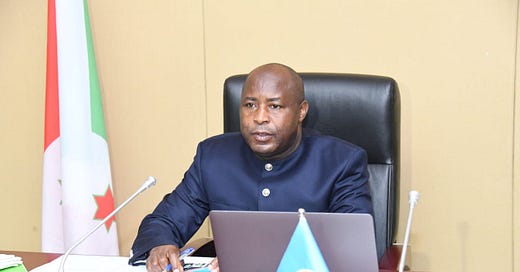Burundi: Decentralization and eGovernance, what to do next?
RegionWeek Newsletter Vol VI, Issue #195 | Wednesday, January 5th, 2022
This is RegionWeek Newsletter, the content targets Business leaders, Decision-makers, and Young professionals with interests in Burundi and East Africa. Subscribe to stay productive, and competitive in a pandemic and disrupted season.
Dear Readers,
This Tuesday, January 4, 2022, the government of Burundi started a 2-day retreat at Ntare House Palace led by President Evariste Ndayishimiye. Reportedly, On the discussion menu are topics such as the decentralization and digitization of public services and public finances, in today’s issue let us take a look at how Burundi is doing in decentralization and digitalization.
eGovernment
When it comes to the digitization of public services Burundi is in the "medium" category in terms of eGovernment development and 33rd in Africa, according to a report by the United Nations Department of Economic and Social Affairs. In the world ranking, it is 168th out of 193 countries in 2020 (against 166th in 2018)
According to Researcher Steve Cedric Bigirimana, Burundi comes in at the low end of most of the rankings. The so poorly ranked position of the country may be attributed to a lack of credibly expressed political will that makes serious reform work impossible or nearly impossible. Without a proper political will and sound administrative activities, the journey to effective use of e-government may be more hampered than it is to date, he notes.
According to the World Bank, while the government has established a nascent online presence, there is no roadmap for implementing a whole-of-government approach to e-government and investing in basic shared infrastructure and services that support the shift to the delivery of transactional and integrated electronic services.
This explains the score of 29.9 out of 100 obtained on the United Nations e-Government Development Index for 2018. On the private sector side, digital e-commerce platforms and new business models based on data are struggling to establish themselves over time, most of it closing after a few years of activity. The country ranked 150th out of 152 on the 2019 UNCTAD Global E-Commerce (B2C) Index.
RegionWeek is an Independent media project based in Burundi that needs resources to operate at its full potential. You can contribute now, and help the RegionWeek team to publish consistently. Click this link.
Decentralization process
For the past 10 years, the government of Burundi has engaged in a decentralization process to strengthen social cohesion and empower local communities. Most of Burundi’s local administrations, or “communes,” still struggle for fiscal viability, and social accountability remains weak at the local level, according to a report by the Burundian Association of Local Elected Officials.
Burundi’s National Development Plan (2018 to 2027) indicates that the overall strategic objective of decentralization is to: "strengthen decentralization through social cohesion, and improvement of local governance".
Financial decentralization in Burundi is progressing slowly. According to a study carried out by the World Bank, financial data relating to communal spending remains partial. The communes' own resources are estimated on average at around 100 million FBU. To address this weakness, the government created in 2007 the National Communal Investment Fund (FONIC), which stipulated that 15% of the national budget should be transferred to the communal level.
By virtue of Law n° 1/16 of May 25, 2015, the State transferred the following powers to the communes: Territory planning, economic, educational, health, cultural, and scientific development as well as the protection and in terms of the environment, improving the living environment of the population.
The State has granted an initial annual budget of 500 million BIF which has just been increased to 800 million per commune and per year, under the investment budget, but this budget is supervised by the State which determines its amount use (support for cooperatives).
The state of play of decentralization shows that many communes have weak management, planning, and resource mobilization capacities. The state has transferred general powers proposed in communal law but has not transferred the powers provided for in the law transferring state powers to communes.
The Burundian Association of Local Elected Officials report noted that, in certain communes of the country, certain partners have supported the computerization of the accounts of certain communes, but many others are still working with rudimentary management tools. There have been advances in the decentralization policy, but there are still shortcomings linked either to the change in mentality, to the lack of vision or leadership, or to the unwillingness of certain communal administrators.
Bottom line
The 2018-2027 National Decentralization Policy Document defines the Government's vision for decentralization in the following terms: "By 2027, A “ commune” is autonomous, institutionally and financially viable, offers sustainable quality services, in an inclusive environment, attractive and favorable to economic and social development centered on valuing the citizen". Defining the vision is great but is now more urgent to know what is the level of appropriation by the “communes” of the national decentralization policy with a view to the territorialization of development and cooperation policies.
It is clear that high-level political commitment, institutional leadership, and effective coordination across government and the wider ecosystem are needed to support digital transformation. Let us hope that during the government retreat, the leaders will internalize a shared and clearly articulated vision and roadmap in support of digital transformation. The implementation of e-governance should be a comprehensive process, in which organizational and regulatory issues are addressed in addition to technology.
Thanks for reading
Fabrice Iranzi, Editor in Chief | RegionWeek.com
This is the free briefing version. To participate and get to the Zoom Briefing session, you need to join our Premium member Club. (Please contact +25771939153, WhatsApp, Telegram).
The Zoom Briefing session is an opportunity to ask questions about news stories covered by RegionWeek & Partners and to hear from experts on various topics of Interest for Burundi and East Africa.




